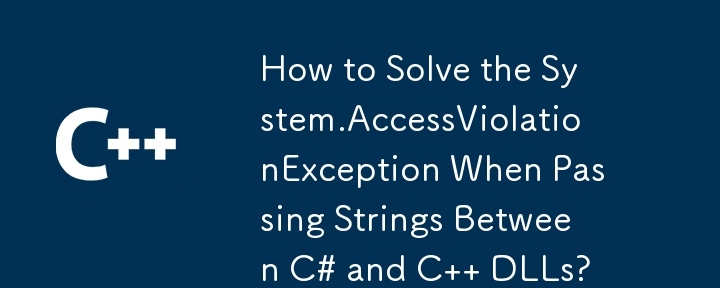

String Interoperability Challenge in C# and C DLLs
Passing strings seamlessly between C# and C DLLs has proven to be a stumbling block for many. Let's delve into the intricacies of this issue and provide a solution that eliminates the persistent System.AccessViolationException.
The Problem
The crux of the problem lies in the inability to pass C std::string objects across the interop boundary. Attempting to do so, as in the given C# code, will result in an access violation exception.
The Solution: Using Interop-Friendly Types
To prevent this error, we must employ interop-friendly data types at the interop boundary. A prime choice is null-terminated character arrays. They excel when memory allocation and deallocation occur within the same module, simplifying data passing from C# to C .
C Code
void foo(const char *str) {
// Perform some action on the string
}C# Code
[DllImport("...", CallingConvention = CallingConvention.Cdecl)]
static extern void foo(string str);
// ...
foo("bar");Passing Data from C to C#
In cases where the callee requires allocating the buffer, the following approach is recommended:
C Code
void foo(char *str, int len) {
// Write up to len characters into str
}C# Code
[DllImport("...", CallingConvention = CallingConvention.Cdecl)]
static extern void foo(StringBuilder str, int len);
// ...
StringBuilder sb = new StringBuilder(10);
foo(sb, sb.Capacity);By embracing interop-friendly data types, we can effectively overcome the string exchange hurdle between C# and C DLLs, paving the way for seamless communication and error-free data flow.
The above is the detailed content of How to Solve the System.AccessViolationException When Passing Strings Between C# and C DLLs?. For more information, please follow other related articles on the PHP Chinese website!
 What is the format of caj
What is the format of caj
 How to install linux system
How to install linux system
 What are the differences between weblogic and tomcat
What are the differences between weblogic and tomcat
 vscode runs c language
vscode runs c language
 How to solve tomcat Chinese garbled characters
How to solve tomcat Chinese garbled characters
 The difference between lightweight application servers and cloud servers
The difference between lightweight application servers and cloud servers
 What software is Xiaohongshu?
What software is Xiaohongshu?
 How to close secure boot
How to close secure boot




